- Home
- Tracy Chevalier
Remarkable Creatures
Remarkable Creatures Read online
Table of Contents
Title Page
Copyright Page
Dedication
ONE - Different from all the rocks on the beach
TWO - An unladylike pursuit, dirty and mysterious
THREE - Like looking for a four-leaf clover
FOUR - That is an abomination
FIVE - We will become fossils, trapped upon beach forever
SIX - A little in love with him myself
SEVEN - Like the tide making its highest mark on the beach and then retreating
EIGHT - An adventure in an unadventurous life
NINE - The lightning that signaled my greatest happiness
TEN - Silent together
POSTSCRIPT
Further Reading
ALSO BY TRACY CHEVALIER
The Virgin Blue
Girl with a Pearl Earring
Falling Angels
The Lady and the Unicorn
Burning Bright
DUTTON
Published by Penguin Group (USA) Inc.
375 Hudson Street, New York, New York 10014, U.S.A.
Penguin Group (Canada), 90 Eglinton Avenue East, Suite 700, Toronto, Ontario M4P
2Y3, Canada (a division of Pearson Penguin Canada Inc.); Penguin Books Ltd, 80 Strand,
London WC2R 0RL, England; Penguin Ireland, 25 St. Stephen’s Green, Dublin 2, Ireland
(a division of Penguin Books Ltd); Penguin Group (Australia), 250 Camberwell Road,
Camberwell, Victoria 3124, Australia (a division of Pearson Australia Group Pty Ltd);
Penguin Books India Pvt Ltd, 11 Community Centre, Panchsheel Park, New Delhi—110
017, India; Penguin Group (NZ), 67 Apollo Drive, Rosedale, North Shore 0632, New
Zealand (a division of Pearson New Zealand Ltd); Penguin Books (South Africa) (Pty) Ltd,
24 Sturdee Avenue, Rosebank, Johannesburg 2196, South Africa
Penguin Books Ltd, Registered Offices: 80 Strand, London WC2R 0RL, England
Published by Dutton, a member of Penguin Group (USA) Inc.
First printing, January 2010
Copyright © 2010 by Tracy Chevalier
All rights reserved
REGISTERED TRADEMARK—MARCA REGISTRADA
LIBRARY OF CONGRESS CATALOGING-IN-PUBLICATION DATA
has been applied for.
eISBN : 978-1-101-15245-4
PUBLISHER’S NOTE
This book is a work of fiction. Names, characters, places, and incidents either are the product of the author’s imagination or are used fictitiously, and any resemblance to actual persons, living or dead, business establishments, events, or locales is entirely coincidental.
Without limiting the rights under copyright reserved above, no part of this publication may be reproduced, stored in or introduced into a retrieval system, or transmitted, in any form, or by any means (electronic, mechanical, photocopying, recording, or otherwise), without the prior written permission of both the copyright owner and the above publisher of this book.
The scanning, uploading, and distribution of this book via the Internet or via any other means without the permission of the publisher is illegal and punishable by law. Please purchase only authorized electronic editions, and do not participate in or encourage electronic piracy of copyrighted materials. Your support of the author’s rights is appreciated.
http://us.penguingroup.com
This is for my son, Jacob
ONE
Different from all the rocks on the beach
Lightning has struck me all my life. Just once was it real. I shouldn’t remember it, for I was little more than a baby. But I do remember. I was in a field, where there were horses and riders performing tricks. Then a storm blew in, and a woman—not Mam—picked me up and brought me under a tree. As she held me tight I looked up and saw the pattern of black leaves against a white sky.
Then there was a noise, like all the trees falling down round me, and a bright, bright light, which was like looking at the sun. A buzz run right through me. It was as if I’d touched a hot coal, and I could smell singed flesh and sense there was pain, yet it weren’t painful. I felt like a stocking turned inside out.
Others begun pulling at me and calling, but I couldn’t make a sound. I was carried somewhere, then there was warmth all round, not a blanket, but wet. I knew where I was because it was water and I knew water—our house was close to the sea, I could see it from our windows. Then I opened my eyes, and it feels like they haven’t been shut since.
The lightning killed the woman holding me and two girls standing next to her, but I survived. They say I was a quiet, sickly child before the storm, but after it I grew up lively and alert. I cannot say if they’re right, but the memory of that lightning still runs through me like a shiver. It marks powerful moments of my life: seeing the first crocodile skull Joe found, and finding its body myself; discovering other monsters on the beach; meeting Colonel Birch. Other times I’ll feel the lightning strike and wonder why it’s come. Sometimes I don’t understand, but accept what the lightning tells me, for the lightning is me. It entered me when I was a baby and never left.
I feel an echo of the lightning each time I find a fossil, a little jolt that says, “Yes, Mary Anning, you are different from all the rocks on the beach.” That is why I am a hunter: to feel that bolt of lightning, and that difference, every day.
TWO
An unladylike pursuit, dirty and mysterious
Mary Anning leads with her eyes. That was clear even the first time we met, when she was but a girl. Her eyes are button brown and bright, and she has a fossil hunter’s tendency always to be looking for something, even when on the street or in a house where there is no possibility of finding anything of interest. It makes her appear vigorous, even when she is still. I have been told by my sisters that I too glance about rather than hold a steady gaze, yet they do not mean it as a compliment as I do with Mary.
I have long noted that people tend to lead with one particular feature, a part of the face or body. My brother, John, for instance, leads with his eyebrows. It is not just that they form prominent tufts above his eyes, but they are the part of his face that moves the most, tracing the course of his thoughts as his brow furrows and clears. He is the second eldest of the five Philpot siblings, and the only son, which made him responsible for four sisters after our parents’ death. Such circumstances will move anyone’s eyebrows, though even as a boy he was serious.
My youngest sister, Margaret, leads with her hands. Though small, their fingers are proportionately long and elegant, and she plays the piano better than the rest of us. She is given to waving her hands about as she dances, and when she sleeps she throws her arms above her head, even when the room is cold.
Frances has been the only Philpot sister to marry, and leads with her bosom—which I suppose explains that. We Philpots are not known for our beauty. Our frames are bony, our features strong. Moreover, there was really only family money enough for one sister to marry with ease, and Frances won the race, leaving Red Lion Square to become the wife of an Essex merchant.
I have always admired most those who lead with their eyes, like Mary Anning, for they seem more aware of the world and its workings. That is why I get on best with my eldest sister, Louise. She has gray eyes, like all the Philpots, and says little, but when her eyes fix on you, you take notice.
I have always wanted to lead with my eyes as well, but I have not been so fortunate. I have a prominent jaw, and when I grit my teeth—more often than I ought, for the world frustrates me—it tenses and sharpens like an axe blade. At a ball once I overheard a potential suitor say he did not dare ask me to dance for fear of cutting himself on my face. I have never really recovered from that rem
ark. It explains why I am a spinster, and why I dance so seldom.
I have longed to move from jaw to eye, but I have noticed that people do not change which feature they lead with, any more than they change in character. And so I am stuck with my strong jaw that puts people off, set in stone like the fossils I collect. Or so I have thought.
I met Mary Anning in Lyme Regis, where she has lived all her life. It was certainly not where I expected to live. London was, of course, specifically Red Lion Square, where we Philpots grew up. Though I had heard of Lyme, as one does of seaside resorts when they become fashionable, we had never visited. We usually went to Sussex towns such as Brighton or Hastings during the summer. When she was alive our mother was keen for us to breathe the fresh air and bathe in the sea, for she subscribed to the views of Dr. Richard Russell, who had written a dissertation about the benefit of seawater, to bathe in and to drink as well. I refused to drink seawater, but I did swim sometimes. I was at home by the sea, though I never thought that would become a literal truth.
Two years after our parents’ death, however, my brother announced at dinner one evening his engagement to the daughter of one of our late father’s solicitor friends. We kissed and congratulated John, and Margaret played a celebratory waltz on the piano. But in bed that night I wept, as I suspected my sisters did as well, for our London lives as we knew them were over. Once our brother married there would be neither the place nor the money for us all to live at Red Lion Square. The new Mrs. Philpot would of course want to be mistress of her own home, and fill the house with children. Three sisters was a surfeit, especially when we were unlikely to marry. For Louise and I both knew we were destined to remain spinsters. Because we had little money, our looks and characters were meant to attract husbands, yet ours were too irregular to help us. Though her eyes lifted and brightened her face, Louise was very tall—far taller than most men could manage—and had large hands and feet. Moreover, she was so quiet that suitors were unnerved by her, thinking she was judging them. She probably was. As for me, I was small and bony and plain, and I could not flirt, but would try to talk about serious things, and that drove the men away too.
We were to be moved on, then, like sheep shifted from one cropped field to another. And John must be our shepherd.
The next morning he laid on the breakfast table a book he had borrowed from a friend. “I thought for your summer holiday you might like to go somewhere new rather than visit our aunt and uncle in Brighton again,” he suggested. “A little tour, if you like, along the south coast. With the war with France cutting off travel to the Continent, so many more coastal resorts are springing up. There may be places you will like even more than Brighton. Eastbourne, perhaps, or Worthing. Or further afield, to Lymington, or the Dorset coast: Weymouth or Lyme Regis.” John was reciting these places as if going down a list in his head, placing a little tick beside each one as he named it. That was how his tidy solicitor’s mind worked. He had clearly thought through where he wanted us to go, though he would herd us there gently. “Have a look to see what you fancy.” John tapped the book. Although he said nothing, we all knew we were looking not simply for a holiday destination, but for a new home, where we could live in gently diminished circumstances rather than as London paupers.
When he had gone out to his chambers, I picked up the book. “ ‘A Guide to All the Watering and Sea-Bathing Places for 1804,’ ” I read out, for Louise’s and Margaret’s benefit. Flipping through it, I found entries on English towns in alphabetical order. Fashionable Bath had the longest entry, of course—forty-nine pages, along with a large map and a pull-out panoramic view of the city, with its even, elegant facades cupped by surrounding hills. Our beloved Brighton had twenty-three pages and a glowing report. I looked up the towns our brother had mentioned, some of which were little more than glorified fishing villages, warranting only two pages of indifferent platitudes. John had made a dot in the margin of each. I expect he had read every entry in the book and chosen those that suited best. He had done his research.
“What’s wrong with Brighton?” Margaret demanded.
I was reading about Lyme Regis then and grimaced. “Here is your answer.” I handed her the guide. “Look at what John has marked.”
“ ‘Lyme is frequented principally by persons in the middle class of life,’ ” Margaret read aloud, “ ‘who go there, not always in search of their lost health, but as frequently perhaps to heal their wounded fortunes, or to replenish their exhausted revenues.’ ” She let the book drop in her lap. “Brighton is too expensive for the Philpot sisters, then, is it?”
“You could stay here with John and his wife,” I suggested in a burst of generosity. “They could manage one of us, I expect. We may as well not all be banished to the coast.”
“Nonsense, Elizabeth, we shan’t be separated,” Margaret declared with a loyalty that made me hug her.
THAT SUMMER WE TOURED the coast as John had suggested, accompanied by our aunt and uncle, our future sister-in-law and her mother, and John when he could manage it. Our companions made comments like “What glorious gardens! I envy those who live here all year round and can walk in them anytime they like”; or “This circulating library is so well stocked you would think you were in London”; or “Isn’t the air here so soft and fresh? I wish I could breathe this every day of the year.” It was galling to have others judge our future so casually, especially our sister-in-law, who would be taking over the Philpot house and didn’t seriously have to consider living in Worthing or Hastings. Her comments became so irritating that Louise began excusing herself from group outings, and I made more and more tetchy remarks. Only Margaret enjoyed the novelty of the new places, even if only to laugh at the mud at Lymington or the rustic theater at Eastbourne. She liked Weymouth best, for King George’s love of the town made it more popular than the others, with several coaches a day from London and Bath, and a constant influx of fashionable people.
As for myself, I was out of sorts throughout much of the tour. Knowing you may be forced to move somewhere can ruin it as a place for a holiday. It was difficult to view a resort as anything but inferior to London. Even Brighton and Hastings, places that previously I had loved to visit, seemed lacking in spirit and grace.
By the time we reached Lyme Regis, only Louise, Margaret, and I were left: John had had to return to his chambers, and had taken his fiancée and her mother back with him, and our uncle’s gout had caught up with him, sending him and our aunt limping back to Brighton. We were escorted to Lyme by a family we’d met in Weymouth, who accompanied us on the coach and helped us to get settled at lodgings in Broad Street, the town’s main thoroughfare.
Of all the places we visited that summer, I found Lyme the most appealing. It was September by then, which is a lovely month anywhere. With its mildness and golden light it will soften even the grimmest resort. We were blessed with good weather, and with freedom from the expectations of our family. At last I could form my own opinion of where we might live.
Lyme Regis is a town that has submitted to its geography rather than forced the land to submit to it. The hills into town are so steep that coaches cannot travel down them—passengers are left at the Queen’s Arms at Charmouth or the crossroads at Uplyme and brought down in carts. The narrow road leads down to the shore, and then quickly turns its back on the sea and heads uphill again, as if it wants merely to glimpse the waves before fleeing. The bottom, where the tiny River Lym pours into the sea, forms the square in the center of town. The Three Cups—the main inn—is there, across from the Customs House and from the Assembly Rooms that, while modest, boast three glass chandeliers and a fine bay window overlooking the shore. Houses spread out from the center, along the coast and up the river, and shops and the Shambles market stalls march up Broad Street. It is not planned, like Bath or Cheltenham or Brighton, but wriggles this way and that, as if trying to escape the hills and sea, and failing.
But that is not all there is to Lyme. It is as if there are two villages side by
side, connected by a small sandy beach, where the bathing machines are lined up, awaiting an influx of visitors. The other Lyme, at the west end of the beach, doesn’t shun, but embraces the sea. It is dominated by the Cobb, a long gray stone wall that curves like a finger out into the water and shelters the shore, creating a tranquil harbor for the fishing boats and the trading ships that come from all over. The Cobb is several feet high, and wide enough for three to walk along arm in arm, which many visitors do, for it gives a fine view back to the town and the dramatic shoreline beyond of rolling hills and cliffs in green, gray, and brown.
Bath and Brighton are beautiful despite their surroundings, the even buildings with their smooth stone creating an artifice that pleases the eye. Lyme is beautiful because of its surroundings, and despite its indifferent houses. It appealed to me immediately.
My sisters were also pleased with Lyme, for different reasons. For Margaret it was simple: She was the belle of Lyme’s balls. At eighteen she was fresh and lively, and as pretty as a Philpot was ever going to be. She had lovely ringlets of dark hair and long arms she liked to hold aloft so that people could admire their graceful lines. If her face was a little long, her mouth a little thin, and the tendons in her neck a little prominent, that did not matter when she was eighteen. It would matter later. At least she didn’t have my hatchet jaw or Louise’s unfortunate height. There were few to match her in Lyme that summer, and the gentlemen gave her more attention than at Weymouth or Brighton, where she had more competitors. Margaret was happy to live from ball to ball, filling the days in between with cards and tea at the Assembly Rooms, bathing in the sea, and strolling up and down the Cobb with the new friends she had made.

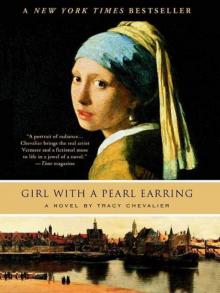 Girl With a Pearl Earring
Girl With a Pearl Earring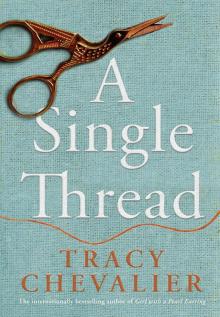 A Single Thread
A Single Thread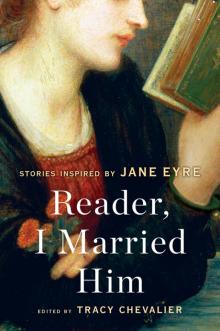 Reader, I Married Him: Stories Inspired by Jane Eyre
Reader, I Married Him: Stories Inspired by Jane Eyre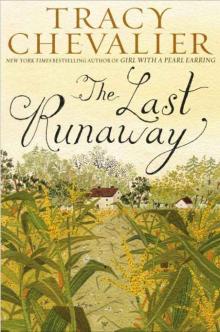 The Last Runaway
The Last Runaway Burning Bright
Burning Bright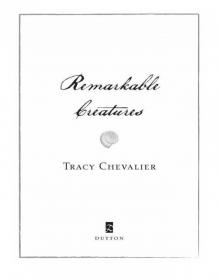 Remarkable Creatures
Remarkable Creatures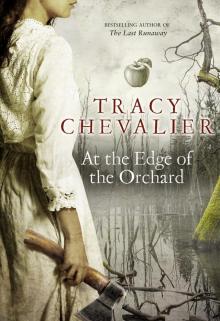 At the Edge of the Orchard
At the Edge of the Orchard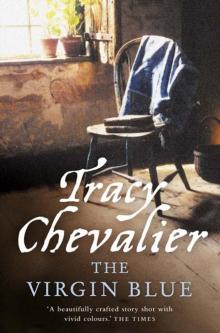 The Virgin Blue
The Virgin Blue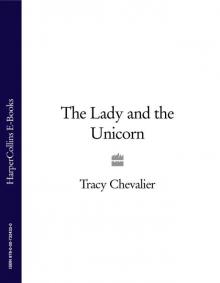 The Lady and the Unicorn
The Lady and the Unicorn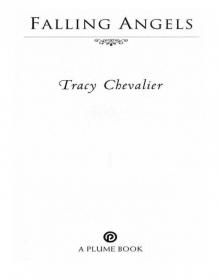 Falling Angels
Falling Angels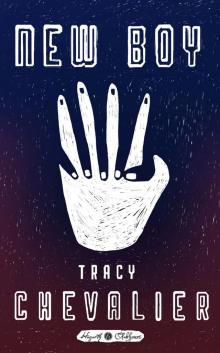 New Boy
New Boy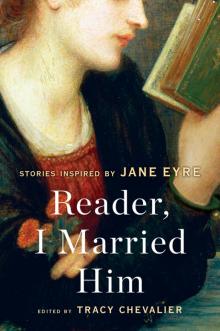 Reader, I Married Him
Reader, I Married Him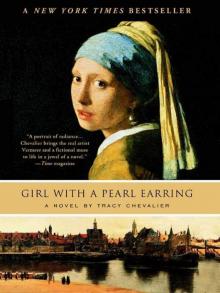 Girl with a Pearl Earring, The
Girl with a Pearl Earring, The